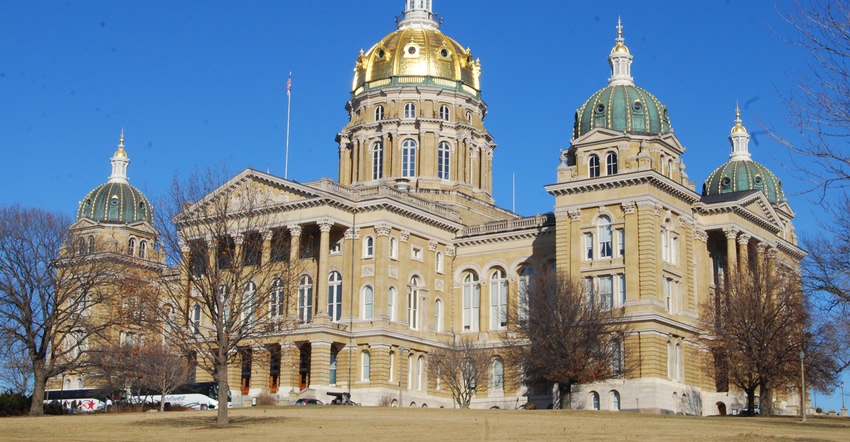February 13, 2017

The Iowa Legislature kicked off the 2017 legislative session on Jan. 9. This month, several key issues appear to be on the forefront. A few of the other bills that have been introduced thus far could also affect farmers.
As was widely reported, Iowa Gov. Terry Branstad and Ag Secretary Bill Northey are focused on a long-term increase in state funding for water quality initiatives. This issue is a hot topic once again at the state house, both in regards to debate over funding and budget issues, despite the Iowa Supreme Court’s recent ruling in regards to the Des Moines Water Works lawsuit.
So far, there have been two bills introduced proposing funding solutions to the water quality issue:
• Senate File 110 proposes to amend the state statute for all commodity groups including dairy, beef, sheep and wool, pork, egg, turkey, soybean and corn to allow for a special referendum by the producers to vote on a water quality checkoff assessment. The assessment rate for the water quality checkoff would be the same rate, and what is currently collected for the checkoff and funds collected through the checkoff must be deposited into the Water Quality and Soil Conservation Fund within the Iowa Department of Agriculture and Land Stewardship. The checkoff, if established, would be refundable if a producer makes a timely request.
• Senate Study Bill 1034 was proposed by Branstad. This bill would appropriate $229 million from Rebuild Iowa Infrastructure Fund over 13 fiscal years for water quality projects into a water quality infrastructure fund created by the bill and would establish two water quality programs (agriculture edge-of-the-field infrastructure and in-field infrastructure). The bill requires the programs to be administered in accordance with the Iowa Nutrient Reduction Strategy.
The proposed programs will provide financing on a cost-share basis to certain ag infrastructure projects, including demonstration projects. The edge-of-field program will support projects that capture or filter nutrients entering into surface water. It includes wetlands, bioreactors, saturated buffers and land-use changes as examples that may qualify. The in-field program will help decrease erosion and precipitation-induced surface runoff, and increase water infiltration rates and soil sustainability.
Section 179 tax coupling
Another hot-button issue is Section 179 tax coupling in light of the state’s budget shortfall. The governor’s proposed budget does not include coupling with the federal tax code for the 2016 tax year. People who are closely following this issue in the Legislature agree that coupling is in “dire jeopardy.” Many of Iowa’s commodity groups have issued a call to action for their members to contact their legislators and push for inclusion of Section 179 coupling.
Section 179 depreciation is an important tool that many farms and tax preparers rely on to manage tax liabilities, and not coupling means that the state tax picture will look very different this year for many farmers.
There have been three bills introduced (Senate Study Bills 1013 and 1014, and Senate File 179) thus far proposing a retroactive and permanent coupling for Iowa tax law with the federal provisions, including Section 179, and decoupling from the federal bonus depreciation allowance. However, these bills appear to be stalling in light of the budget situations. Commodity groups are encouraging their constituents who are concerned about this issue to contact their legislators. We will keep readers updated on any new developments on this important topic.
Some other bills that have been introduced this session of interest to farmers:
• Senate File 103. Seeks to repeal the Iowa inheritance tax on all estates for those dying after July 1, 2017.
• Senate File 57. Would provide that a person who makes necessary improvements to secondary roads, including maintenance and repair, is not liable for civil damages as a result of that improvement.
• Senate File 131. Replaces the term “Small Animal Feeding Operation” (SAFO) in the Animal Agriculture Compliance Act (Chapter 459 of the Iowa Code) with “Small Confinement Feeding Operation” (SCFO), and defines an SCFO as a confinement feeding operation with 250 animal units or less. Provides grandfather provisions for SAFOs already in operation.
• Senate File 24/House File 164. Requires a DNR officer to have a search warrant before entering private property for purposes of investigating a violation or for enforcement of the law.
• Senate Study Bill 1011. Provides that a possessor of land owes no duty of care to a trespasser except for refraining from willful or wanton injury to the trespasser and to use reasonable care to avoid injury to the trespasser after the trespasser’s presence is known.
• House File 175. Makes Palmer amaranth a primary noxious weed and a prohibited invasive plant.
This column is current as of Feb. 9. We will provide updates on the legislative session in the upcoming months, following the funnel deadlines. For additional updates and information on the bills mentioned above, search the bills at legis.iowa.gov.
Herbold-Swalwell is an attorney with Brick-Gentry PC in Des Moines. Contact her at [email protected].
About the Author(s)
You May Also Like






